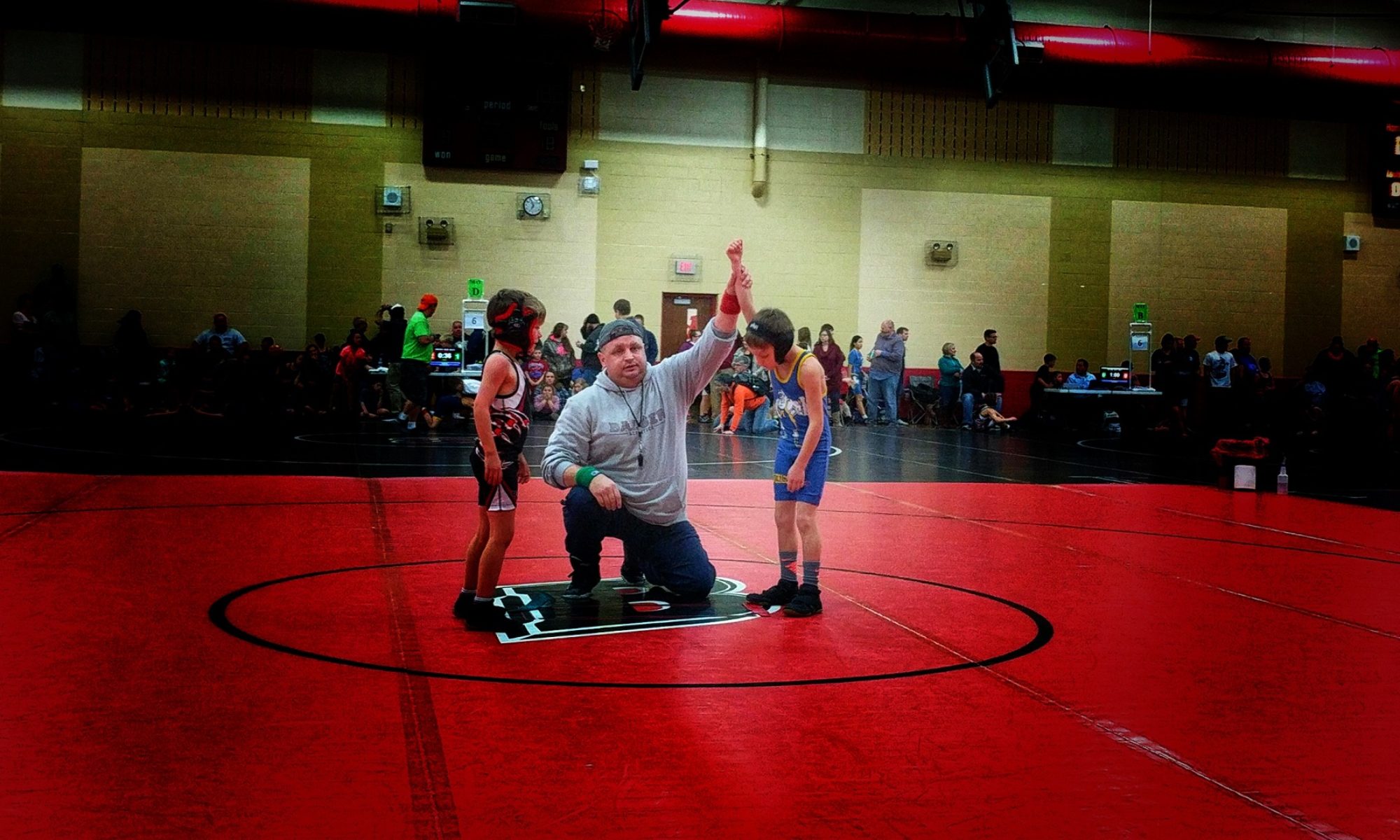Welcome to the Mukwonago Wrestling Club! The goal of this guide is to familiarize you with the sport of wrestling. Hopefully, the information outlined in this guide will help introduce you to the sport.
To sign up for this club please go to the “Members Site” and click the registration button. This will walk you through the sign up process.
Practices
Your Practice time will be either 6:00 to 7:00 or 7:05 to 8:30 depending on age / grade.
Questions / Suggestions
When you register your child in the club, you also register your voice for questions and suggestions of improvement. If you ever have questions or suggestions, please contact a coach or a board member. We maintain a board presents at all practices and happy to assist or answer any questions.
Don’t let a win get to your Head
or a loss get to your Heart.
Athletic Development
Please understand that your child may not have instant success in wrestling. Very few wrestlers start winning when they are first introduced to this sport. There will be other wrestlers who started earlier, have more wrestling experience, or may at this time be more athletic. In some cases, it may be a few years before a young wrestler develops the competitive edge. The physical, emotional and competitive stages of athletic development vary for every young athlete. Some children may be ready for tournament competition in their 1st year; others develop this confidence later. You know and understand your child’s development better than anyone. Don’t push or drive too hard until you feel the child is ready. Give your child the choice, listen to what they say and give a lot of praise and encouragement.
Parental Support
We encourage parents to attend wrestling practice with their child, especially at the younger levels. Parents may not have wrestling experience, but their involvement is critical. Your child’s progress in the sport can develop at a faster rate if you are assisting or are visible at the practice sessions.
But remember to be their parent and not their coach. You are there to encourage them and also, at the younger age many of them are doing it just for you. Here are 10 things that a parent can do to improve there wrestlers experience.

Competition, Winning & Losing
Unfortunately, many wrestling tournaments available to your child do not take into account your child’s athletic development or experience. Most Tournaments take into account weight and age or year in school. On occasion it is not uncommon for your young wrestler to meet more physically dominant and talented wrestlers. Regardless of whether your child wins or loses, always reinforce the positive. Let them know you are proud of them no matter what the result is. Emphasize the importance of participation, not winning or losing.
Wrestling Styles
There are 3 primary styles in amateur wrestling: Folkstyle, Freestyle and Greco. All three are taught at the MWC. Folkstyle is the primary American style of wrestling coached in the Mukwonago Wrestling Club, taught December through March. It is also the style wrestled at the Middle School, High School and the College level. Freestyle and Greco-Roman are the internationally recognized styles of wrestling. It is the style you will watch at the Olympic Games. These two styles are coached in the Mukwonago Wrestling Club, in April. Although these 2 styles are similar to Folkstyle, there are differences in scoring, strategy and technique. We encourage Freestyle/Greco wrestling for all wrestlers. Most place winners at the state high school tournament have strong Freestyle/Greco backgrounds.
Equipment & Dress
For club practices: shorts “clean” tennis shoes, and a tight-fitting T-shirt is all that we require. Loose and baggy clothing is discouraged because hands and fingers can get twisted or bent. Wrestling shoes, headgear, and wrestling singlets are encouraged but optional. At the young youth level practices, there is generally not enough contact to warrant the use of headgear. Headgear, however, is recommended to prevent rubbing, banging or twisting of the ear causing “cauliflower ear” (swelling and hardening of ear soft tissue). Mouthpieces are not required but highly encouraged for any one with braces. We ask that all wrestlers wear a “clean” pair of tennis or wrestling shoes. Do not wear the same shoes that you wear outside. Stocking feet are not recommended because they provide limited traction. We also need to keep the wrestling mats clean at all times.

Equipment costs:
- Shoes (club has recycle program reselling for $5) – retail price $30.00 – $100.00
- Headgear – retail price $30.00-$50.00
- Knee Pad – retail price $30.00 pair
- Singlet is issued by the club, require a $100 refundable deposit
Practice Session Rules
Please review these rules with your child:
- Please, no street shoes in the wrestling room (this means Parents too). Sand and dirt deteriorate the mat surfaces. Parents and wrestlers, please remove all footwear before entering the wrestling room.
- Do not play on fitness machines or equipment.
- Please respect the coaches and both groups by staying quiet while we coach in the center.
- Please, no climbing or running up the wall mats.
- Make sure you take home everything that you brought to practice. Shoes, shirts, headgear are often left behind and disappear.
- Report all injuries to the coach immediately.
- Have Fun
Injuries & Skin Conditions
Wrestling is a contact sport. Jammed fingers, bloody noses, and sore muscles are common in this sport. Major injuries in all contact sports can occur, but are not common. We make an effort to monitor practices carefully so illegal holds or potentially dangerous predicaments are halted at once. Wrestling is a safe sport and has no more injuries than football, soccer, basketball or baseball. If at any time your child breaks out with a skin condition or rash, report it to the coach and see your family doctor. On rare occasions we will have a case of a rash break out on a wrestler. The most common types of skin conditions are ringworm, impetigo, boils and cold sores. Although these conditions are often blamed on the wrestling mat, the likely case of transmission is through bodily contact. Our wrestling room has the wrestling mats disinfected daily, if you can help mop the mats that would be great.
Wrestling Associations
The primary wrestling association in Wisconsin is the Wisconsin Wrestling Federation, affiliated with the USA Wrestling organization. It also provides secondary injury insurance if your child is injured at a tournament or practice, and is required by the school district to practice and hold tournaments at the high school to limit their liability. Most, but not all, wrestling tournaments, require that you purchase a USA Wrestling Card. Proof of date of birth is required for these cards. These cards offer injury insurance if your child is injured at a tournament or practice, and you do not have a primary health insurance. Newsletters and magazines are also part of the card fee.
“If everyone is moving forward together, then success takes care of itself.” – Henry Ford
KIDS TOURNAMENTS
The traditional youth (Grades K – 8) Folkstyle wrestling tournaments begin in January and ends in March. Youth tournaments are held at most all schools throughout the state. As mentioned before, most tournament pairings are made by age / year in school and weight. Your young wrestler could be bracketed in with more experienced wrestlers. Tournament entry costs range between $15 – $20. Most tournaments are 4-man round robin, so each wrestler has 3 matches typically 3 minutes long. Awards are distributed to each wrestler at the end of the tourney. Weigh-in times will vary but are usually on the same day of the tournament from 7:00 a.m. to 8:30 a.m. The number of tournaments you attend is up to you, but these tournaments offer the needed “mat time” for success in the sport.
Finally check out our web site www.mukwonagowrestlingclub.com it contains a ton of information both inside and outside the club, including updates to schedules and other events.

